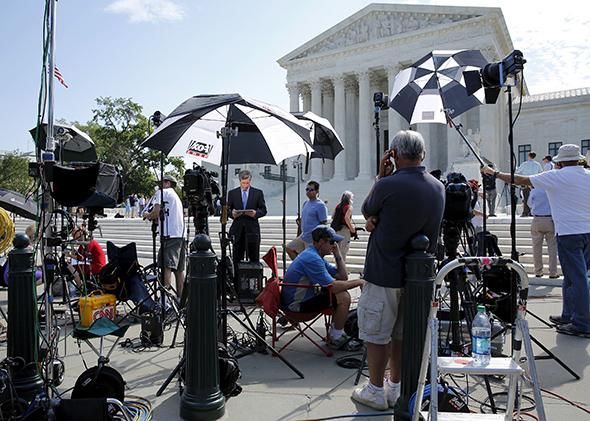Dear Walter, Judge Posner, Marty, Mark and Kenji:
Good morning to all of you. As we prepare for Thursday morning’s decisions, I just want to reflect on what happens at the court on these big decision days. Because it’s every kind of crazy. And perfectly fixable.
At 10 this morning, the court will announce opinions in the ceremonial courtroom and also hand out great reams of paper opinions in the public information office. Reporters standing before cameras on the steps of the court will then attempt to describe the cases through some process of mentalism, or by using the services of interns in winged shoes—runners tasked with delivering paper copies of decisions to their media overlords. (There was an incident earlier this week involving a CNN intern who accidentally strapped a camera to his chest in the pressroom. We need not discuss further.)
Now all this decision day insanity might be remedied by allowing the American people to listen in live to opinion announcements, but the court will not permit this. According to a great new report by Tony Mauro—this is in part because having a coherent audio announcement policy would reveal that the court has an incoherent opinion summary policy. As Tony writes:
Release of opinion announcements is an especially prickly issue with the justices. The announcements are summaries written by the justice who wrote the majority, and the other justices in the majority don’t sign off on the wording. Current and former justices have said they are sometimes surprised to hear the announcement, which may overstate or oversimplify the holding in ways they don’t approve. As a result, some justices don’t want the opinion announcements to be featured in the news media as an accurate representation of court decisions.
So this morning, I am killing time by working up this scenario that is half torts exam and half Greek tragedy, wherein an NBC intern is racing across the plaza at 10:05 a.m. ET. It’s slippery, because that plaza is waxy like a luge, on the vague architectural principle that justice is best served slippery. In my scenario, the intern trips, falls, breaks an ankle—oh, and also she hails from a state with no state-established insurance exchange, only a federal exchange. And, wait for it: When they prize the opinion from her hand, it’s King v. Burwell, the health care challenge. At which point, the court begins finally to allow audio coverage of opinions.
It could happen.
All right, talk to you at 10:05, gentlemen. May the 2015 Running of the Interns proceed without incident.
Read the previous entry, by Mark Joseph Stern | Read the next entry, by Walter Dellinger.
